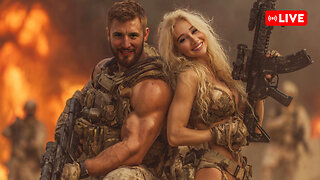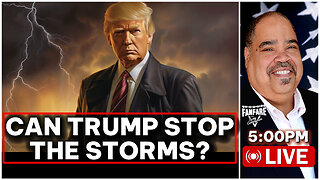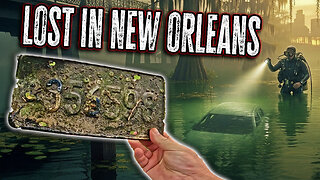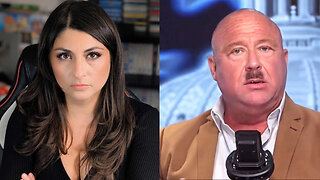Premium Only Content

Nation vs. Corporation: Are You Really a National?
The video explores the concepts of nation and security, personal reflections on important thoughts, a discussion on nationality in the US and Canada, the impact of nationalism on inclusiveness, and concludes with a reflection on the Christmas Truce during World War I.
[04:13-04:37]
The man with dreadlocks breaks down the concepts of 'nation' and 'security', questioning who the nationals are and what national security means.
This is something that affects everybody out in our reality. You know, and it's again, it's to bring the concepts of our existence into the forefront. If they're claiming national security, what is a national? What is the security that is being provided for the nationals? And who are the nationals, right? It's national security, right?
[06:41-07:06]
The speaker reflects on the importance of sharing thoughts that provoke significant thinking, emphasizing their potential benefit to others.
This is something I need to share. Because if I think it's important enough to actually make me stop and really think about it, it's, again, important enough to any of the quote-unquote average person out there to also do the same. And if I'm going to have that thought brought into my brain, then it's a disservice to not share that if it can actually benefit somebody out there. This is why I'm bringing it up again.
[07:06-08:16]
The discussion contrasts the United States Corporation and the United States of America, clarifying distinctions in nationality and citizenship, particularly how Canadians and Americans relate to these concepts.
Because, again, let's use the United States as an example. The United States Corporation is different than the United States of America. Those are 2 different entities. Same way as Canada is the same respect equivalent to what the United States Corporation is. And they're only neighbors, but they're claiming to be bordering each other, having a different status. You know, it's really hard for Canadians to say they're nationals. Because, again, they understand that they're not nationals. But they'll claim to be a Canadian. And if the Corporation of Canada throws out, you know, concept of being a national it's something that is just registered in the brain and not really thought about. Because again, anybody that's a citizen in Canada is not a national. United States citizens are not nationals.
[08:48-10:07]
The speaker discusses how nationalism can lead to exclusivity or inclusivity, advocating for respect among nations as part of a global family rather than competition.
And the way I see nationalities and nationalism Because again, it can go 2 ways. Nationalism and nationalities can be taken to a point of inclusiveness where people try to stay with their own and try to excommunicate or make other nationalities feel bad about not being them. And it's this whole competition. We have this idea of competition on the planet that is supposed to create profit. However, and there's nothing wrong with healthy competition to make others do their best to inspire more of the maximum that they can create. There's nothing wrong with that. But when it comes to the opposite of that, where it's not about competition, it's about respecting the differences as a family. If we look at nations as a part of an extended family of humanity that we are all a part of, and these nations can make up a hand on a bigger entity, which is connected to the planet.
[14:07-15:22]
Reflecting on World War I, the speaker highlights the Christmas Truce as a moment of harmony among soldiers amid chaos, driven by shared beliefs and humanity.
Because again, it was a time where men that were actually engaged in destroying each other and destroying the planet, destroying lives, destroying everything that was good. You know, as in innocent, you know, they were put to the feet of destruction and they carried out a task wanting or unwanting. They had to do it because they were told they had to do it. And even though many women in that time stood up against this to try to convince their men that they didn't have to follow this corporate ideology, even though they didn't know it was a corporation takeover at that time, inherently they knew it was wrong. The women. And the men chose to go. And this is a beautiful example of, even in a time of chaos, war, destruction, where you are put against your human family to kill your other brother from another mother, they were actually able to come together in their religious belief system, because most of them were a part of the Christian faith and they all celebrated Christmas and at this time they were actually able to one of the first like peace in war at that time where
-
 2:44:07
2:44:07
DLDAfterDark
9 hours ago $10.98 earnedGun Talk - Whiskey & Windage - The "Long Range" Jouney - After Hours Armory
22.2K1 -
 9:37
9:37
Film Threat
11 hours agoSHELBY OAKS REVIEW | Film Threat
14.1K6 -
 35:40
35:40
The Mel K Show
6 hours agoMel K & Dr. Mary Talley Bowden MD | Heroes of the Plandemic: Doing What is Right No Matter the Cost | 10-25-25
39.1K13 -
 3:06:20
3:06:20
FreshandFit
11 hours agoNetworking At Complex Con With DJ Akademiks
208K23 -
 7:02:27
7:02:27
SpartakusLIVE
9 hours agoThe King of Content and the Queen of Banter || Duos w/ Sophie
40.3K2 -
 1:47:12
1:47:12
Akademiks
8 hours agoLive on complexcon
40.2K4 -
 3:07:36
3:07:36
Barry Cunningham
10 hours agoCAN PRESIDENT TRUMP STOP THE STORMS? ON AIR FORCE ONE | SNAP BENEFITS | MAMDANI | SHUTDOWN DAY 25
42.2K71 -
 13:38
13:38
Exploring With Nug
16 hours ago $9.43 earnedWe Searched the Canals of New Orleans… and Found This!
32.7K6 -
 13:36
13:36
Clintonjaws
1 day ago $34.72 earnedCBC 2024 Election Night - Highlights - This Is Priceless!
68K21 -
 23:20
23:20
Lady Decade
12 hours ago $22.87 earnedI Spent The Night With Alex Jones
38.4K35